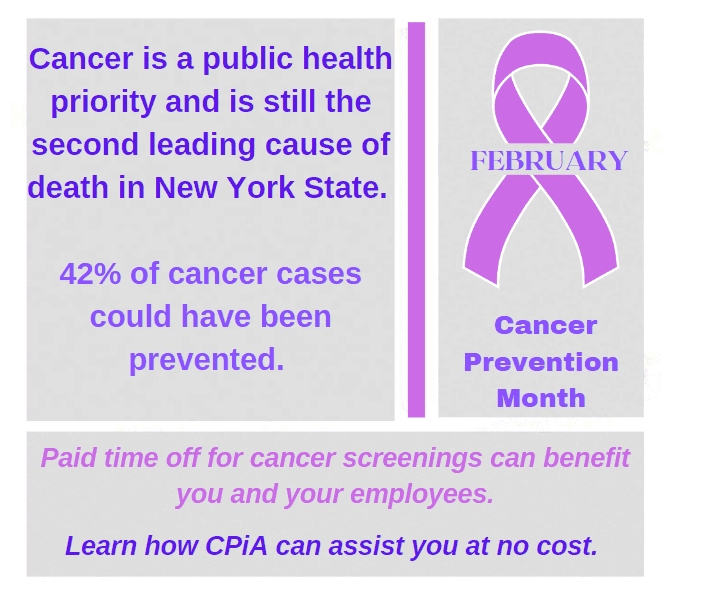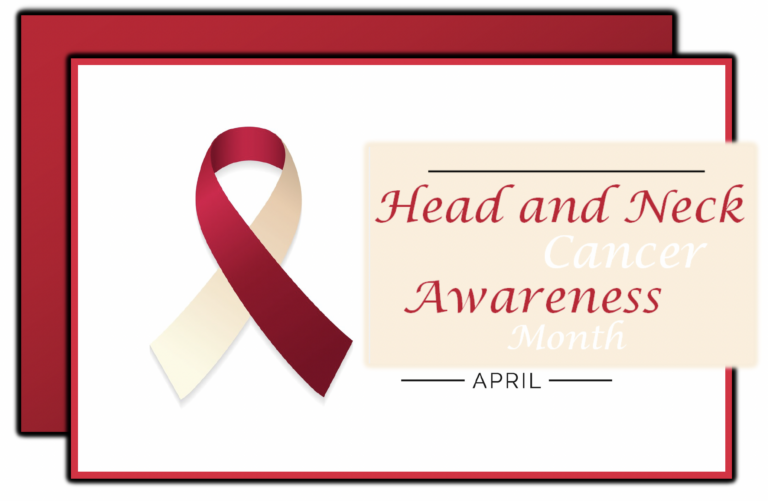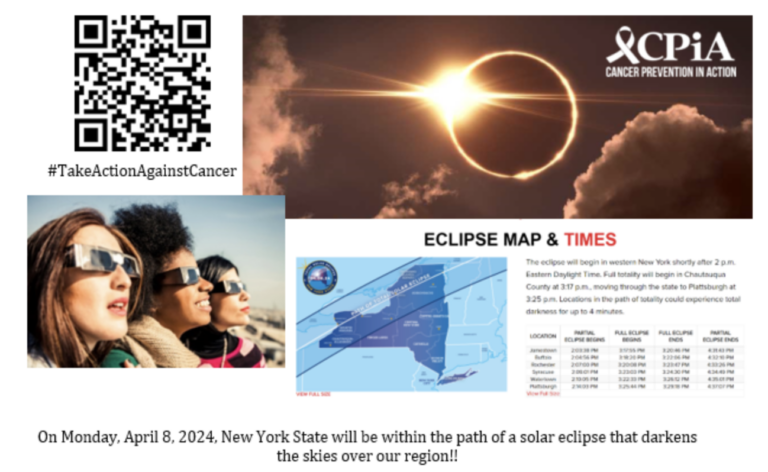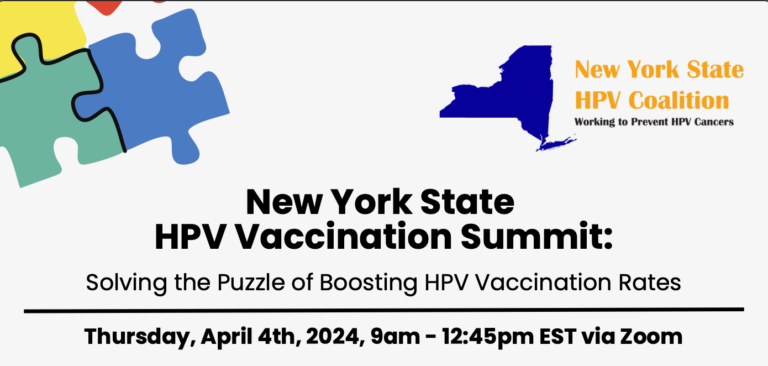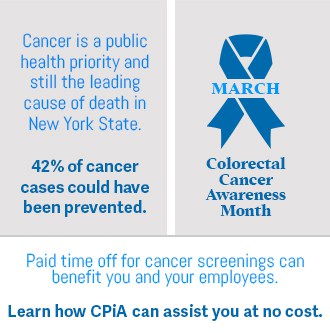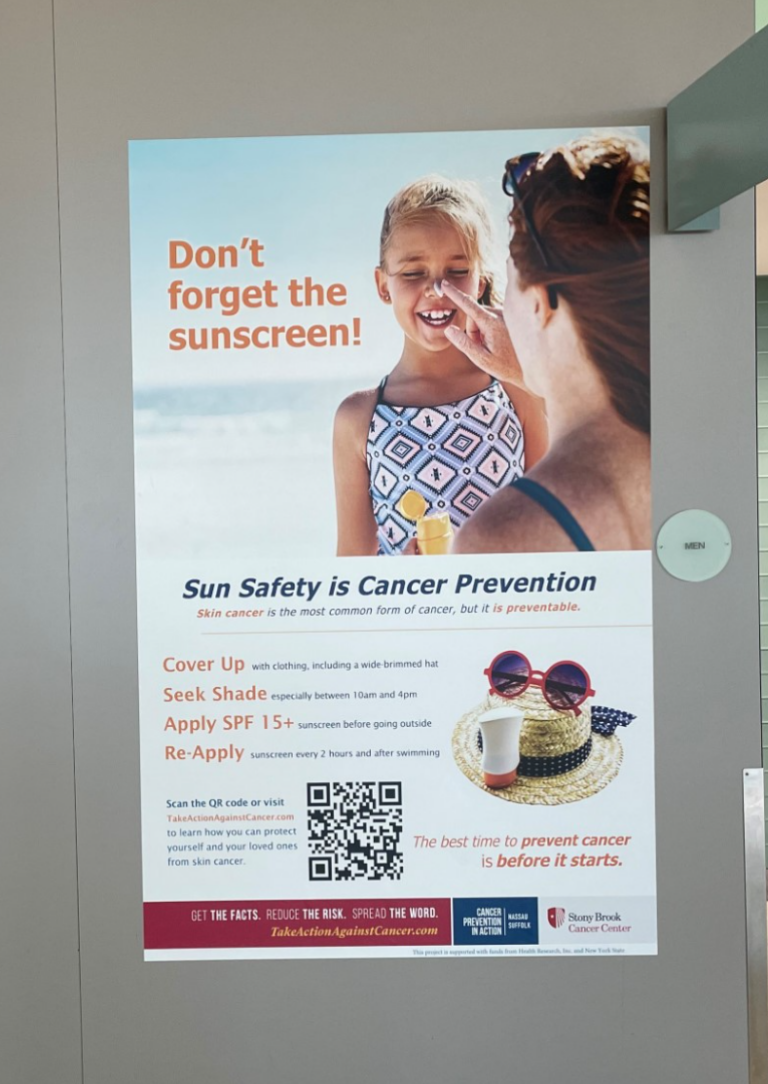One out of four cancer deaths are caused by breast, cervical, or colon cancer. These cancers can be found early or prevented through cancer screening.
Does your workplace offer paid time off for cancer screenings? Employees may be more likely to get screened for cancer if they can take paid time off for screenings. Employees getting regular cancer screenings can reduce health care costs related to cancer and improve work force health.

NYS Cancer Prevention in Action programs in Broome, Fulton, Jefferson, Lewis, Montgomery, Oswego, Schnectady, St. Lawrence, and Tioga counties educate employers about paid time off for cancer screening policies and help them to adopt these policies for their employees.
Reduce Your Cancer Risk
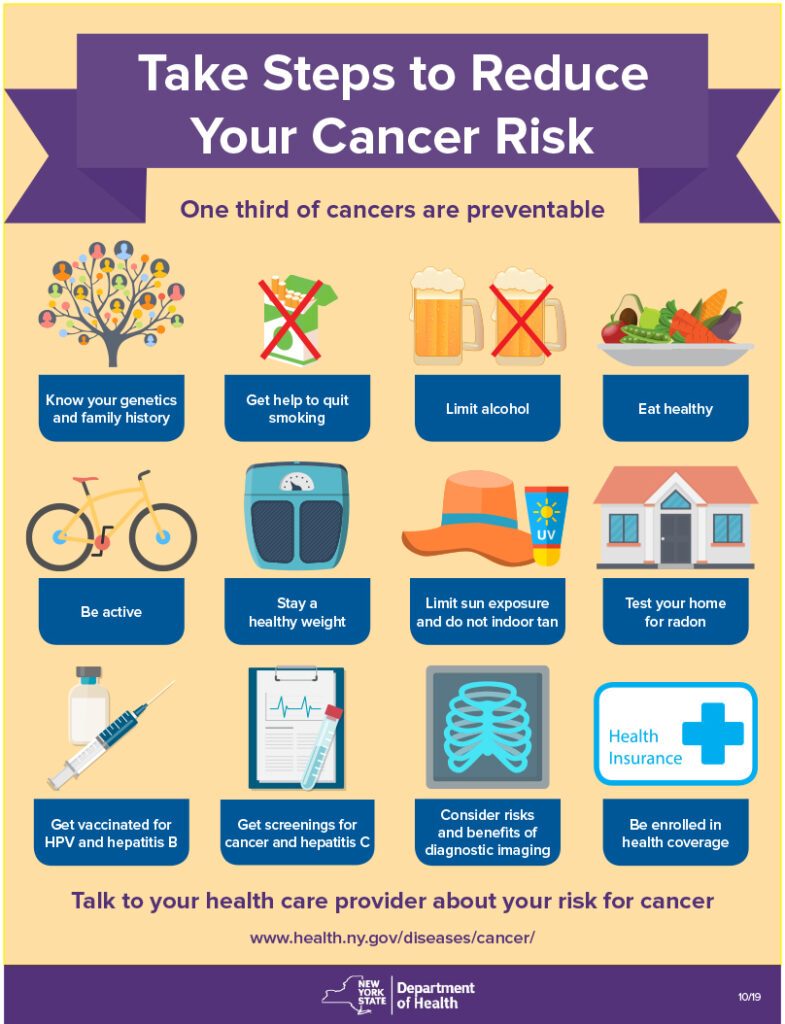
Information for
New Yorkers
Know Your Genetics and Family History
The genes you inherit might put you at risk for some cancers. If you have a family history of cancer, consider a cancer risk assessment, and depending on the results, genetic counseling and genetic testing. While you can’t change your genes, there are steps you can take to lower your risk: www.health.ny.gov/diseases/cancer/
genetics
Get Help to Quit Smoking
Smoking is an addiction to nicotine and quitting is hard. Support and medication from your health care provider can improve your chances of quitting. Most health insurance, including Medicaid, can help. Talk to your health care provider or contact the free and confidential NYS Smokers’ Quitline at 1-866-NY-QUITS (1-866-697-8487) or www.nysmokefree.com
Limit Alcohol
Drinking alcohol increases your risk for oral cavity and pharynx, larynx, esophagus, liver, colon, rectum, and female breast cancers. The Centers for Disease Control and Prevention (CDC) provides information about preventing cancer by reducing alcohol use: www.cdc.gov/alcohol/fact-sheets/prevention.htm
Eat Healthy, Be Active, and Stay a Healthy Weight
Several cancers are linked to poor nutrition, physical inactivity, and obesity. Talk with your health care provider about programs nearby that can help you make healthy eating choices and increase physical activity.
Breastfeeding also plays a role in cancer prevention for mothers and infants.
The WIC Program offers nutritious foods, nutrition education, and breastfeeding support to low-income pregnant women, breastfeeding and non-breastfeeding new mothers, and children up to age 5 who are nutritionally at risk. The “myBenefits” program can help you find out about these programs and how to apply: www.mybenefits.ny.gov/mybenefits/begin
Limit Sun Exposure and Don’t Indoor Tan
Exposure to UV radiation from the sun and from indoor tanning can lead to skin cancer. Do not indoor tan. When in the sun, wear clothes that cover your body. Use a broad-spectrum sunscreen of at least SPF 15: www.health.ny.gov/SunSafety
Test Your Home for Radon
Radon is a naturally occurring gas that causes lung cancer. Test your home for radon every five years, when buying a home, and after major renovations. If you have a radon system, check it every two years to make sure it is working properly. Low-cost radon test kits are available for NYS residents: www.health.ny.gov/Radon
Get Vaccinated for HPV and Hepatitis B
HPV (human papilloma virus) is one of the most common sexually transmitted infections. HPV infection can lead to cancer in men and women, including cancers of the cervix, vagina, penis, anus and throat. Children ages 11 – 12 should be vaccinated for HPV. Catch-up vaccination is recommended for anyone through age 26 who is not adequately vaccinated. Adults age 27 – 45 may also want to discuss the HPV vaccine with their health care provider to determine if the HPV vaccine is right for them.
Vaccination for the hepatitis B virus can prevent the infection and lower your risk for liver cancer. Everyone up to age 18 should be vaccinated for hepatitis B. Health care workers, anyone with multiple sex partners, injection-drug users and males who have sex with males should also be vaccinated for hepatitis B.
The NYS Vaccines for Children program provides vaccines at no cost to eligible children. Ask your health care provider or local health department for more information.
Get Screenings for Cancer and Hepatitis C
If you were born 1945 – 1965, you may be infected with the hepatitis C virus, which can lead to liver cancer. Talk to your
healthcare provider about getting screened: www.health.ny.gov/diseases/communicable/hepatitis/hepatitis_c
Cancer screening can find disease in people who have no signs of illness. Many cancers can be treated if detected early.
Talk to your health care providers about cancer screening tests and when you should get them. The New York State Department of Health offers free breast, cervical and colorectal cancer screening to eligible uninsured and underinsured men and women. Contact the Cancer Services Program: 1-866-442-2262 or www.health.ny.gov/diseases/cancer/services
Consider Risks and Benefits of Diagnostic Imaging
Radiation from diagnostic imaging (for example, x-rays and CT scans) is linked with certain cancers, but these procedures may be medically necessary. Discuss the benefits and risks of diagnostic imaging with your health care provider so that you can make the best decisions about these procedures.
Be Enrolled in Health Coverage
Being enrolled in health coverage improves your access to medical care and can reduce your risk for illnesses, including cancer. Get enrolled and find out about financial assistance to lower the cost of health coverage from the NY State of Health: 1-855-355-5777 (TTY: 1-800-662-1220) or https://info.nystateofhealth.ny.gov/resources

